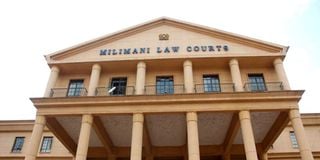Court: Workers sacked for stealing employers' money entitled to salary, benefits

Milimani Law Courts in Nairobi. The Labour Court has ruled that an employer cannot withhold dues of a worker or deduct amount of money allegedly stolen by the worker if they are still under prosecution.
A worker sacked for stealing money from employer is entitled to his terminal dues and salary even if they are under prosecution, the Labour Relations court in Nairobi has ruled.
Justice Jacob Gakeri stated that an employer cannot withhold dues or wages of the worker or deduct the amount of money allegedly stolen in an attempt to recover the loss occasioned by theft.
While ruling on a Sh12 million dispute between betting firm Betika and its sacked head of technology, Fred Gitonga, the judge said it is unlawful to withhold the terminal dues of an employee because of alleged theft. He also ruled that it is unlawful for an employer to deduct an amount from an employee’s salary over alleged money theft.
Stating that a charge sheet of a criminal case is neither a conviction nor an indication of culpability, the judge said decision by Betika to withhold Mr Gitonga’s terminal dues on the premise that he had a pending criminal case involving theft was unjustified and unlawful.
Justice Gakeri stated that among the nine situations mentioned in Section 19(1) of the Employment Act under which an employer may deduct money from the wages of an employee, being charged in a court for any offence is not among them.
“Section 19 of the Employment Act, 2007 entitles the employer to deduct certain amounts from the employee’s wages or salary for the specified purposes and Section 19(3) of the Act prescribes the outer limit. None of the nine situations mentioned by Section 19(1) of the Act include being charged in a court of law for any offence,” said the judge.
Justice Gakeri dismissed bid by the betting firm to withhold two thirds of the terminal dues owed to Mr Gitonga pending the hearing and determination of criminal case where he is accused of stealing Sh11 million from the company.
It is alleged that between January 13 and February 3, 2022 Mr Gitonga stole Sh11,007,393 belonging to the betting firm and was arrested and the criminal case was ongoing.
The court heard that the company, Shop & Deliver Limited, conducted internal investigations and took disciplinary action against Mr Gitonga and terminated his employment for gross misconduct.
The company stated that it was obligated to pay Mr Gitonga Sh12,562,575 as terminal dues but owing to the criminal charges facing him, it withheld two-thirds of the total sum due of Sh8,375,050 pending the determination of the criminal case.
According to the company, it was apprehensive that it may not recover the money stolen and believed it was best to withhold part of Mr Gitonga’s terminal dues pending the criminal case and the deduction was explained to him.
It added that it has the right to withhold or deduct wages in accordance with Section 19 of the Employment Act, 2007.
But Justice Gakeri ruled that provisions of the Employment Act, 2007 do not empower an employer to withhold the employee’s dues because of a pending criminal case on stealing by servant.
“The provisions of Section 19(1)(b) of the Employment Act cited by the Betika refers to “any damage done to or loss of property wilfully in . . .” It is clear to the court that money was not envisioned as property and including it would be overstretching imagination,” said the judge.
He observed that the legal provision is based on a conclusion that the employee was culpable for the damage or loss. Mr Gitonga’s criminal case is awaiting determination, he observed.
Terming Betika’s move as “unilateral decision”, the judge also questioned why the company was calling upon the court to affirm or adopt a decision already implemented if the company believed it was doing the right thing.
The judge further emphasized that withholding of salary or wages is only sanctioned in specifically defined instances such as where the employee has taken an advance or is on suspension, surcharge, or other legitimate causes.
The court concurred with Mr Gitonga’s lawyer Henry Kurauka’s arguments that a charge sheet was neither a conviction nor an indication of culpability.
Justice Gakeri observed that Betika appeared to have convicted the sacked worker already and was awaiting the court’s confirmation.
He added that Mr Gitonga remains a suspect or accused person and is entitled all the Constitutional rights of an accused person including presumption of innocence and fair trial before an impartial court.
The court further ruled that Betika’s application to be allowed to withhold Mr Gitonga’s dues lacked anchorage as it was not a substantive suit.





